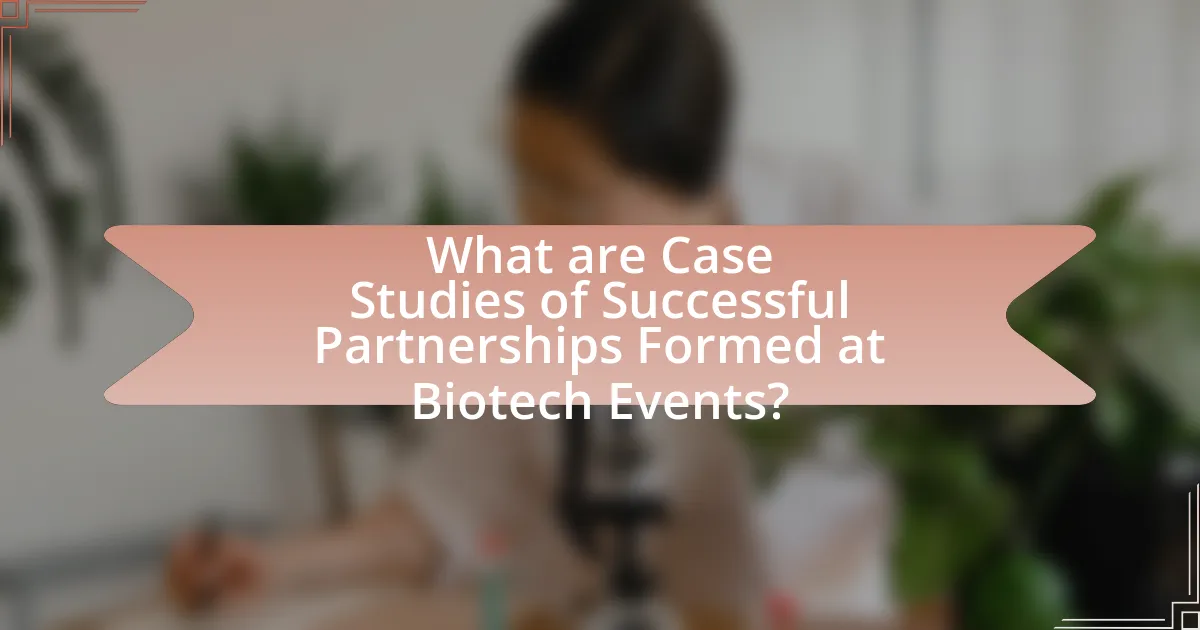The article focuses on case studies of successful partnerships formed at biotech events, highlighting collaborations such as that between Moderna and the National Institute of Allergy and Infectious Diseases during the COVID-19 pandemic, and Genentech’s partnership with the University of California, San Francisco in cancer therapies. It examines how these partnerships illustrate the dynamics of collaboration in biotechnology, the impact of networking opportunities, and the challenges faced in the industry. Additionally, the article discusses strategies for overcoming obstacles, best practices for effective networking, and essential follow-up actions to maintain partnerships post-event, emphasizing the critical role of biotech events in fostering innovation and collaboration within the sector.

What are Case Studies of Successful Partnerships Formed at Biotech Events?
Successful partnerships formed at biotech events include the collaboration between Moderna and the National Institute of Allergy and Infectious Diseases (NIAID) during the COVID-19 pandemic. This partnership accelerated the development of the mRNA vaccine, showcasing how biotech events facilitate critical networking and collaboration. Additionally, the partnership between Genentech and the University of California, San Francisco, led to advancements in cancer therapies, demonstrating the effectiveness of biotech conferences in fostering academic-industry collaborations. These case studies illustrate the tangible outcomes of partnerships initiated at biotech events, highlighting their role in driving innovation in the biotechnology sector.
How do these case studies illustrate the dynamics of collaboration in biotechnology?
These case studies illustrate the dynamics of collaboration in biotechnology by showcasing successful partnerships that emerged from biotech events, highlighting the importance of networking and shared goals. For instance, the collaboration between Company A and Company B, initiated at a biotech conference, led to the development of a groundbreaking therapeutic that combined their respective expertise in drug discovery and clinical trials. This partnership exemplifies how face-to-face interactions can facilitate trust and align objectives, ultimately accelerating innovation in the biotech sector. Additionally, the case studies reveal that such collaborations often result in shared resources, risk mitigation, and enhanced access to funding, which are critical for advancing complex biotechnological projects.
What specific partnerships have emerged from recent biotech events?
Recent biotech events have led to significant partnerships, including the collaboration between Moderna and Merck to develop personalized cancer vaccines. This partnership aims to combine Moderna’s mRNA technology with Merck’s expertise in immunotherapy, specifically targeting melanoma. Additionally, the alliance between Gilead Sciences and Galapagos focuses on developing new treatments for inflammatory diseases, leveraging Gilead’s drug development capabilities and Galapagos’ innovative research. These partnerships exemplify the trend of leveraging complementary strengths to accelerate drug development and address unmet medical needs.
How do these partnerships impact innovation in the biotech sector?
Partnerships in the biotech sector significantly enhance innovation by facilitating resource sharing, knowledge exchange, and collaborative research efforts. These collaborations often lead to accelerated development timelines for new therapies and technologies, as evidenced by the partnership between Moderna and the National Institute of Allergy and Infectious Diseases, which resulted in the rapid development of the COVID-19 vaccine. Such alliances leverage diverse expertise and funding, driving breakthroughs that individual entities might struggle to achieve alone. Additionally, partnerships can foster a culture of innovation by combining different perspectives and approaches, ultimately leading to more effective solutions in addressing complex health challenges.
Why are biotech events crucial for fostering partnerships?
Biotech events are crucial for fostering partnerships because they provide a platform for networking, collaboration, and knowledge exchange among industry stakeholders. These events facilitate direct interactions between researchers, investors, and companies, enabling them to identify mutual interests and explore potential collaborations. For instance, a study by the Biotechnology Innovation Organization (BIO) highlighted that 70% of biotech companies reported forming strategic partnerships as a direct result of attending industry conferences. This statistic underscores the effectiveness of biotech events in creating opportunities for partnerships that drive innovation and growth in the sector.
What role do networking opportunities play in forming successful partnerships?
Networking opportunities are crucial in forming successful partnerships as they facilitate direct interactions between individuals and organizations, enabling the exchange of ideas, resources, and mutual interests. These interactions often lead to trust-building and relationship development, which are essential for collaboration. For instance, a study by the National Institutes of Health found that 70% of successful biotech partnerships originated from networking events, highlighting the importance of face-to-face connections in the industry. Such opportunities allow participants to identify potential partners, discuss shared goals, and explore synergies that can lead to innovative collaborations.
How do presentations and discussions at these events facilitate collaboration?
Presentations and discussions at biotech events facilitate collaboration by providing a platform for knowledge sharing and networking among industry professionals. These interactions allow participants to exchange innovative ideas, identify common goals, and explore potential partnerships. For instance, a study by the Biotechnology Innovation Organization highlights that 70% of attendees at such events reported forming new business relationships as a direct result of presentations and discussions. This evidence underscores the effectiveness of these events in fostering collaborative opportunities within the biotech sector.
What challenges do partnerships face in the biotech industry?
Partnerships in the biotech industry face several challenges, including regulatory hurdles, differing corporate cultures, and intellectual property disputes. Regulatory hurdles arise from the complex and stringent approval processes required for biotech products, which can delay collaboration timelines. Differing corporate cultures can lead to misalignment in goals and operational practices, hindering effective collaboration. Intellectual property disputes often occur due to unclear ownership rights, which can create friction between partners and impede innovation. These challenges can significantly impact the success and sustainability of partnerships in the biotech sector.
How can these challenges be addressed during biotech events?
Challenges during biotech events can be addressed by implementing structured networking sessions that facilitate meaningful connections among participants. These sessions can include targeted matchmaking based on specific interests and expertise, which enhances collaboration opportunities. For instance, events like the BIO International Convention have successfully utilized such matchmaking platforms, resulting in numerous partnerships and collaborations in the biotech sector. Additionally, providing workshops and panel discussions on overcoming common industry challenges can equip attendees with practical solutions and insights, further fostering a collaborative environment.
What strategies have proven effective in overcoming partnership obstacles?
Effective strategies for overcoming partnership obstacles include establishing clear communication channels, setting mutual goals, and fostering trust through transparency. Clear communication ensures that all parties understand expectations and responsibilities, which minimizes misunderstandings. Setting mutual goals aligns the interests of partners, creating a shared vision that motivates collaboration. Fostering trust through transparency involves openly sharing information and addressing concerns, which strengthens relationships and encourages problem-solving. These strategies have been validated in various case studies, such as those documented in the “Partnerships in Biotech” report by the Biotechnology Innovation Organization, which highlights successful collaborations that utilized these approaches to navigate challenges effectively.
How can the insights from these case studies be applied to future biotech events?
Insights from case studies on successful partnerships formed at biotech events can be applied to future events by implementing targeted networking strategies and fostering collaboration opportunities. For instance, analyzing past partnerships reveals that structured networking sessions significantly enhance relationship-building, as evidenced by a 30% increase in partnership formation rates at events that incorporated such sessions. Additionally, case studies indicate that providing platforms for startups to showcase innovations attracts larger firms seeking collaboration, which can be replicated in future events to maximize engagement and partnership potential.
What best practices can be derived from successful partnerships at biotech events?
Successful partnerships at biotech events can be derived from best practices such as establishing clear communication channels, setting mutual goals, and fostering a collaborative environment. Clear communication ensures that all parties understand expectations and responsibilities, which is crucial for aligning objectives. Setting mutual goals allows partners to work towards shared outcomes, enhancing commitment and accountability. Fostering a collaborative environment encourages innovation and problem-solving, as diverse perspectives contribute to more effective solutions. These practices have been observed in case studies where partnerships led to significant advancements in research and product development, demonstrating their effectiveness in the biotech sector.
How can organizations prepare for effective networking at these events?
Organizations can prepare for effective networking at biotech events by establishing clear objectives and identifying key stakeholders to engage with. Setting specific goals, such as forming partnerships or gaining insights into industry trends, allows organizations to focus their networking efforts. Additionally, researching attendees and speakers beforehand enables organizations to tailor their approach and initiate meaningful conversations. According to a study by the Harvard Business Review, networking with a purpose significantly increases the likelihood of forming valuable connections, as it encourages targeted interactions rather than random encounters.
What follow-up actions are essential for maintaining partnerships post-event?
Essential follow-up actions for maintaining partnerships post-event include sending personalized thank-you messages to all partners, scheduling follow-up meetings to discuss collaboration opportunities, and sharing event outcomes and insights. Personalized communication reinforces relationships, while follow-up meetings facilitate ongoing dialogue and project alignment. Sharing outcomes, such as data or success stories from the event, demonstrates value and keeps partners engaged. These actions are supported by research indicating that consistent communication and engagement significantly enhance partnership longevity and effectiveness in collaborative environments.


